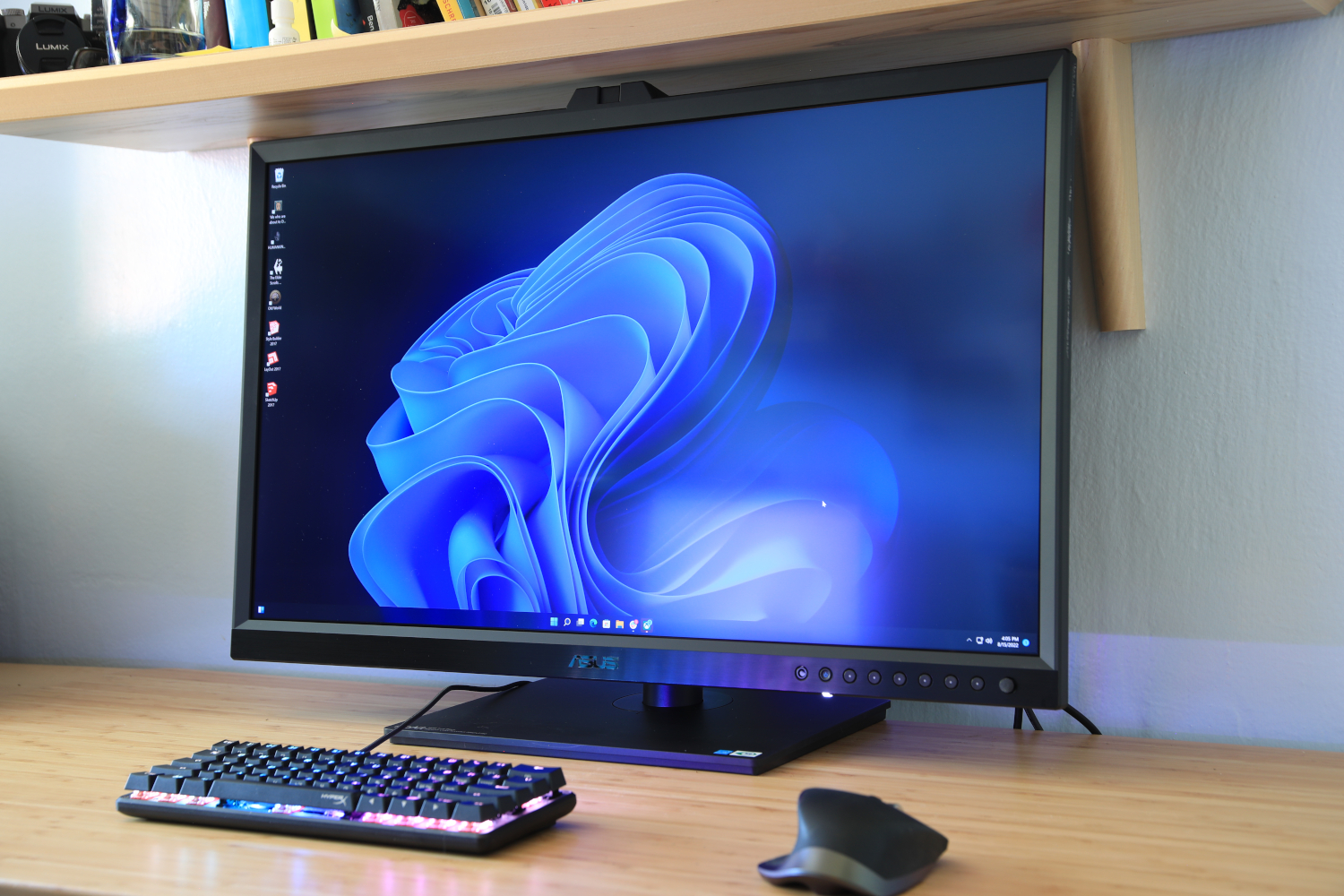 At a glance
At a glanceExpert's Rating
Pros
- Excellent color performance and contrast
- Good overall HDR performance
- 240Hz refresh rate with great motion clarity
- Big price drop from prior 4K OLED monitors
Cons
- Stand is too large
- Curved panel is an acquired taste
- HDR brightness is still just okay
Our Verdict
The Alienware AW3225QF is a gorgeous 4K OLED monitor ideal for both PC gaming and game consoles.
Best Prices Today: Alienware AW3225QF
Those looking to buy an OLED monitor were treated to dozens of new options through 2023, but some particular sizes and resolutions remained rare—including 4K, 32-inch OLED monitors. Though not entirely unavailable, most such monitors were extremely expensive. The Alienware AW3225QF takes a step towards lowering the price, providing a 4K, 240Hz QD-OLED panel for $1,199.
Further reading: See our roundup of the best 4K monitors to learn about competing products.
What are the Alienware AW3225QF’s specs and features?
The Alienware AW3225QF is a rather unusual monitor, and not just because of its 32-inch 4K QD-OLED panel. It’s also a curved display and provides a 240Hz refresh rate, the latter of which wasn’t available in prior 4K OLED panels (but will be available from multiple companies in 2024).
- Display size: 32-inch widescreen
- Native resolution: 3840×2160
- Panel type: QD-OLED
- Refresh rate: 240Hz
- Adaptive sync: Nvidia G-Sync, VESA AdaptiveSync 240
- HDR: VESA DisplayHDR True Black 400, Dolby Vision
- Ports: 1x DisplayPort 1.4, 1x HDMI 2.1 with eARC, 1x HDMI 2.1, 1x USB 3.2 Gen 1 Type-B upstream, 3x USB 3.2 Gen 2 Type-A downstream, 1x USB 3.2 Gen 1 Type-C downstream with BC 1.2 power charging
- VESA mount: 100x100mm
- Speakers: None
- Price: $1,199
There’s more around back, where the AW3225QF’s connectivity differs from most monitors. It has one HDMI port with eARC support. The AW3225QF also supports Dolby Vision HDR, which is fairly common among HDR televisions but unusual for an HDR monitor. Alienware seems to expect some owners will use the AW3225QF more like a small TV than a desktop monitor.
How is the Alienware AW3225QF’s design?
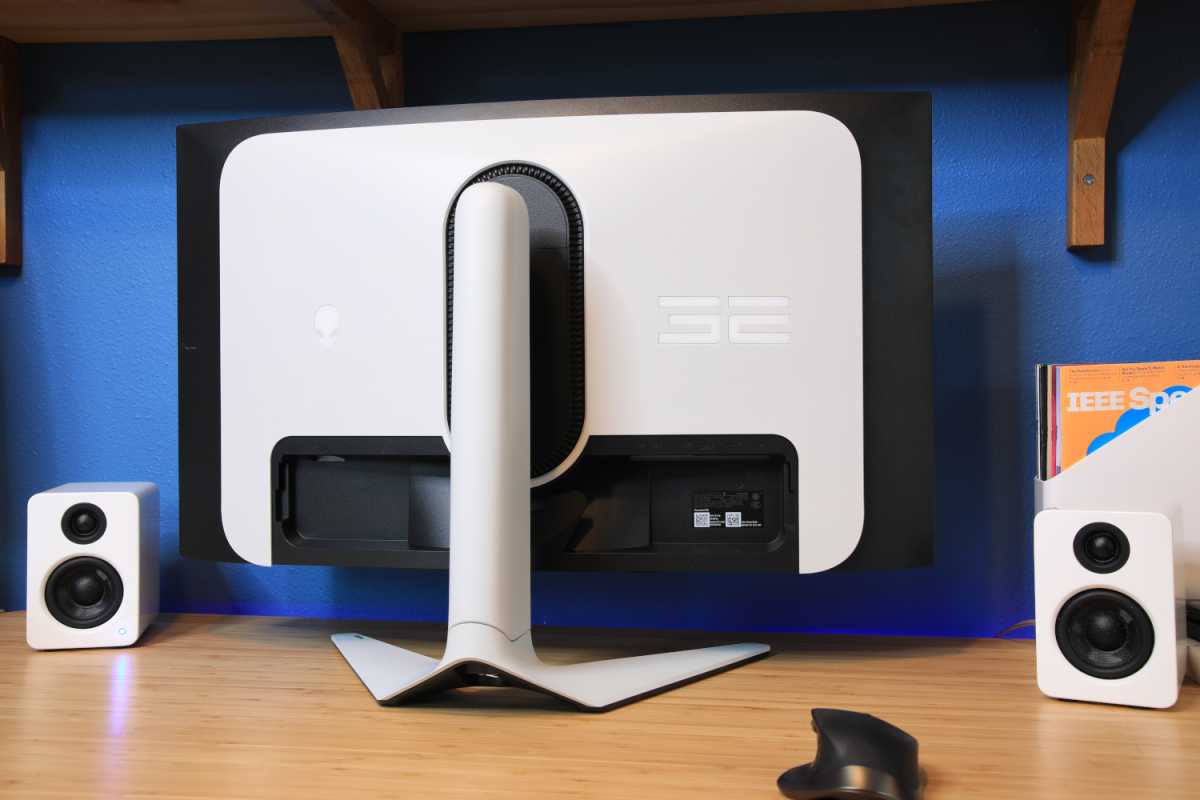
Alienware AW3225QF (backside).
Matt Smith
I received the Alienware AW3225QF in an attractive white-and-black colorway similar to past Alienware displays. It’s a familiar but alluring look that uses varying materials, textures, and colors to craft a more luxurious and upscale feel.
It’s still clad in plastic, like nearly all modern monitors and televisions, but the AW3225QF definitely has a touch of class not found with most alternatives. Samsung’s recently revised Odyssey monitors are the only competitors I find equally attractive.
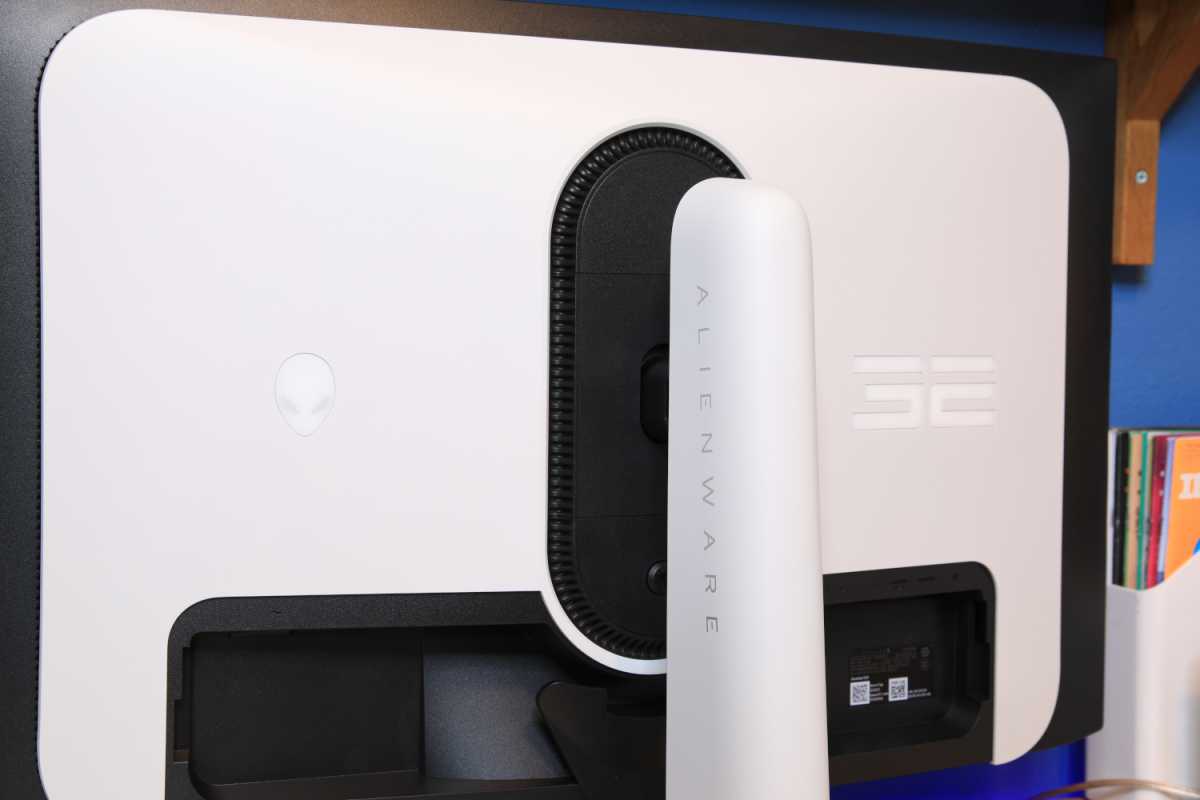
Matt Smith
The AW3225QF is a curved monitor with a modest but noticeable 1700R curve. I’m not a fan of this decision, as I don’t find 32-inch widescreen monitors wide enough for the curve to add to my immersion. Those who don’t like a curve could instead consider the 4K 32-inch Odyssey OLED G8.
Alienware ships the monitor with a huge, overbuilt stand that adjusts for height, tilt, swivel. It keeps the AW3225QF firmly planted (you’d have to go at it with a baseball bat to knock it over), but the stand’s wide, wing-shaped design takes up a lot of desk space. It’s also deep, which means the monitor may sit uncomfortably close if your desk is narrow. A smaller stand would be a better choice for the display.
That problem can be avoided with the 100x100mm VESA mount, which makes the monitor compatible with third-party monitor arms and stands.
How is the Alienware AW3225QF’s connectivity and menu?
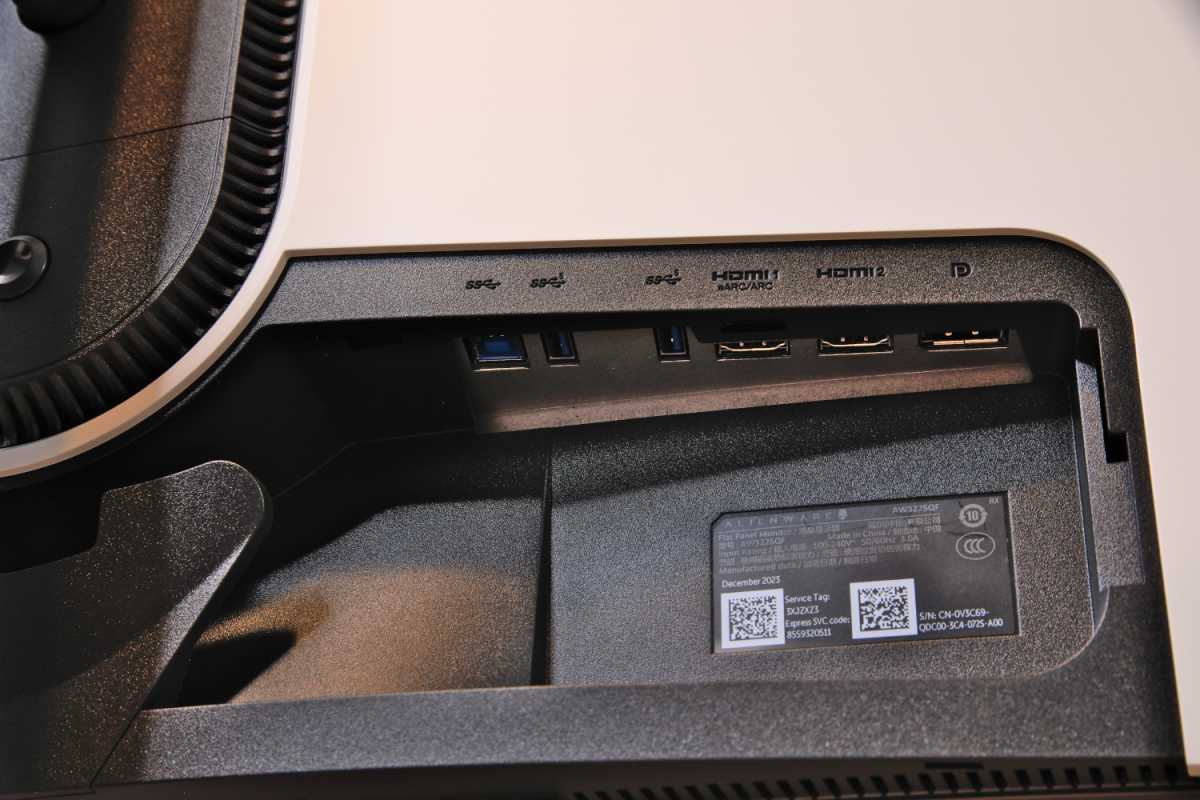
Alienware AW3225QF’s connectivity features.
Matt Smith
The Alienware AW3225QF’s video connectivity is unusual for a computer monitor. It has a DisplayPort 1.4 port, which is typical, but pairs that with two feature-packed HDMI ports.
Both ports are HDMI 2.1, and both support the monitor’s native resolution of 3840×2160 at its maximum refresh rate of 240Hz. They also support FRL and VRR as specified in HDMI 2.1, so they’re broadly compatible with enhanced refresh rates and variable refresh rate / adaptive sync signals delivered from a PC or a game console.
One of the two ports also supports eARC, which is uncommon for a monitor. ARC stands for Audio Return Channel. It should let users connect a soundbar or other audio device via HDMI to the monitor, which can then be used alongside any video input. The eARC port also supports Dolby Atmos sound.
With that said, I found the eARC feature didn’t work with my Yamaha YAS-207 soundbar (which supports DTS:X instead of Dolby Atmos). It’s possible that a setting prevented this, as Dell did not have a finalized user manual available at the time I’m writing this review. I will update if I am able to get it to work.
The AW3225QF also has USB connectivity, though it’s rather tame. It has three USB-A ports and one USB-C port. The USB-C port includes power charging, but only delivers enough power to charge a smartphone at an acceptable speed. Video isn’t supported over USB-C, either. All of the USB ports are driven by a USB-B upstream port, which means the USB connectivity is best suited to work alongside a desktop PC or a large laptop.
Alienware’s menu system is controlled by a joystick centered on the monitor’s chin. It responds quickly to user input, and Alienware’s menus are easy to navigate. A fair range of options are available, including multiple SDR and HDR modes and a custom color mode that allows for color calibration. Color temperature adjustment is supported, but only through “Warm” and “Cool” presets. I also found a gamma setting was available only when “Console Mode” or “Creator Mode” was enabled. That’s confusing, and Alienware would do well to place a broad range of color temperature and gamma controls in one location, so they are easier to find and use.
There’s also a few gamer-centric features such as a “black equalizer,” which increases the brightness of dark areas of the display, and an on-screen crosshair. These features are standard for any modern gaming monitor, but still appreciated.
The AW3225QF doesn’t include speakers. It also lacks an audio line-out jack, so it’s not possible to pass audio to a 3.5mm headset or similar desktop speakers. Alienware says it dropped the audio line-out connection because most modern headsets or speakers use USB or have gone wireless.
How is the Alienware AW3225QF’s SDR image quality?
The Alienware AW3225QF is a 4K OLED monitor, so image quality expectations are high — and delivered. It’s a top-notch monitor for SDR content that suffers just one small flaw common to many OLED displays.
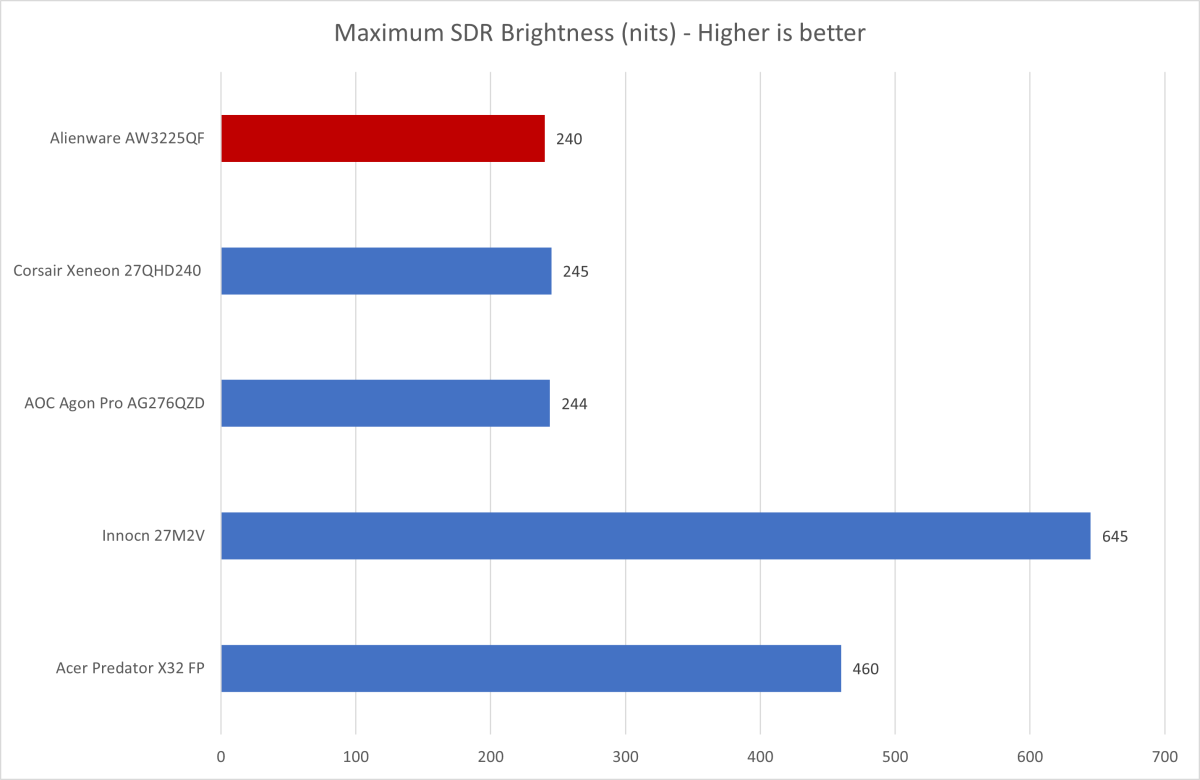
Matt Smith
The flaw? Brightness. The AW3225QF has a maximum SDR brightness of 240 nits, which is certainly towards the low end for a modern computer monitor. Many monitors can now exceed 400 nits, but OLED displays tend to land between 200 and 300 nits. The AW3225QF’s surface is glossy, too, so glare shines through.
This isn’t a problem for most people, as 240 nits remains more than adequate in a room with light control (like blinds or curtains). I typically used the monitor at just 25 percent of its maximum, especially after dark. But it could become an issue if the monitor is used in a room with large windows that lack blinds or curtains, or in a brightly-lit space like an office bullpen.
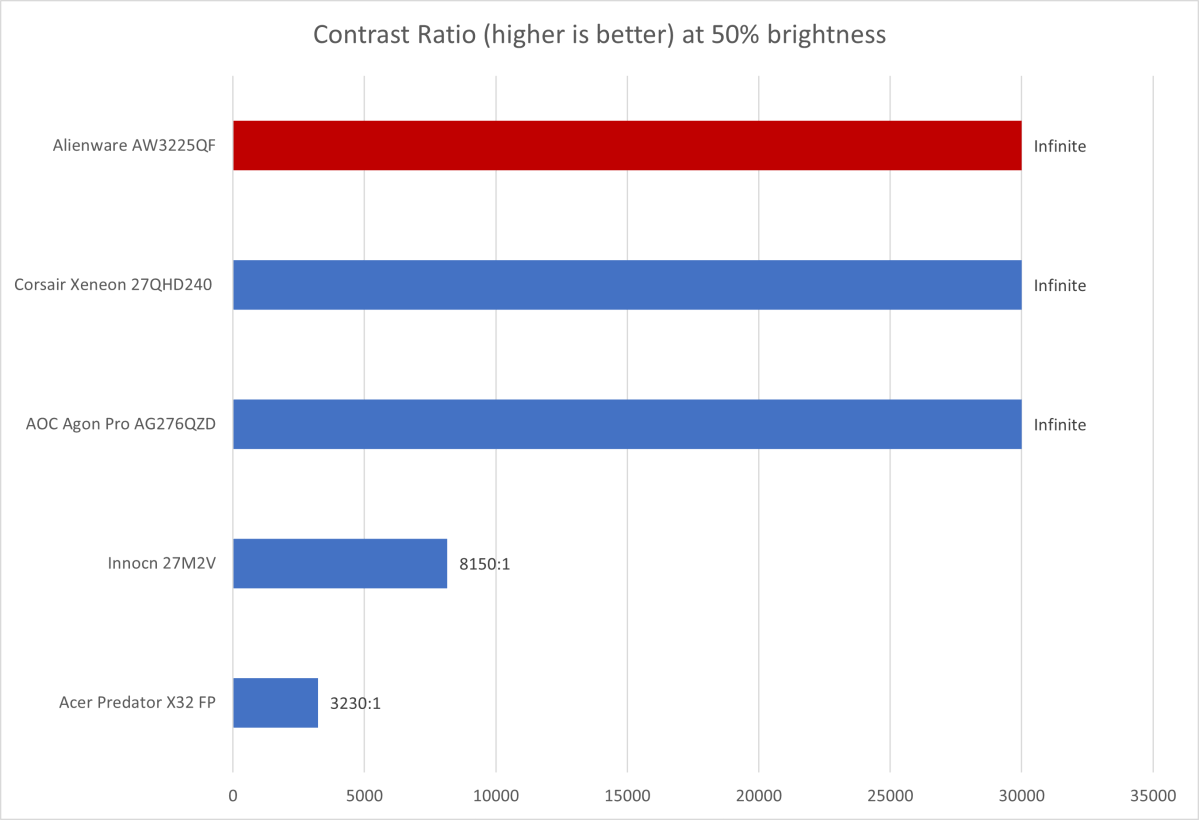
Matt Smith
Contrast, on the other hand, is a strength of all OLED displays, and the AW3225QF delivers excellent results. It provides an effectively infinite contrast ratio, as the monitor achieves a minimum luminance of zero nits. That means dark areas of the screen appear perfectly dark, and adds a sense of depth and realism to everything viewed on the display. It’s especially excellent for games with a dark presentation, like Diablo IV or Resident Evil: Village.
Shoppers should note, though, that this performance is typical across a broad range of modern OLED displays. The AW3225QF has no advantage, or disadvantage, when compared to alternatives.
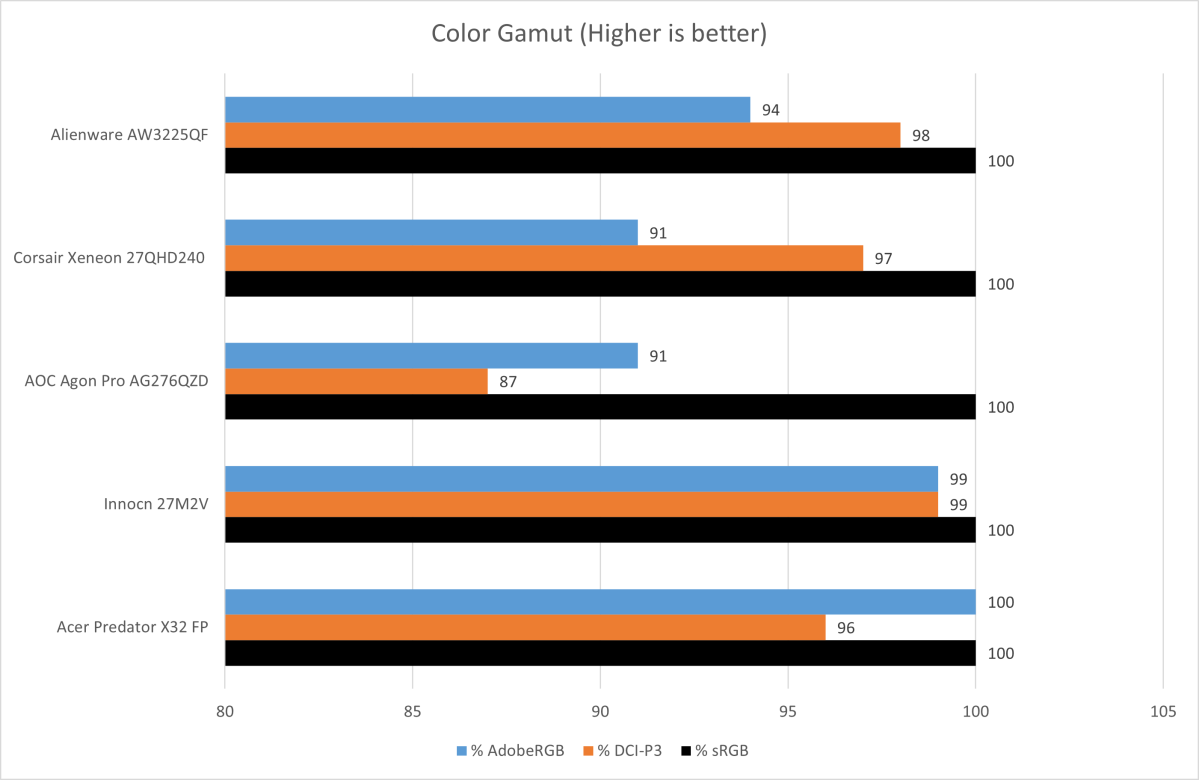
Matt Smith
The AW3225QF delivers great color gamut results, as its color gamut spans 100 percent of sRGB, 98 percent of DCI-P3, and 94 percent of AdobeRGB. These results are better than some OLED monitors from 2023, but fall a slight step behind the best Mini-LED monitors, such as the Acer Predator X32 FP. Still, the AW3225QF performs well and delivers a color gamut that’s far more than adequate for nearly any task you’d perform on a computer.
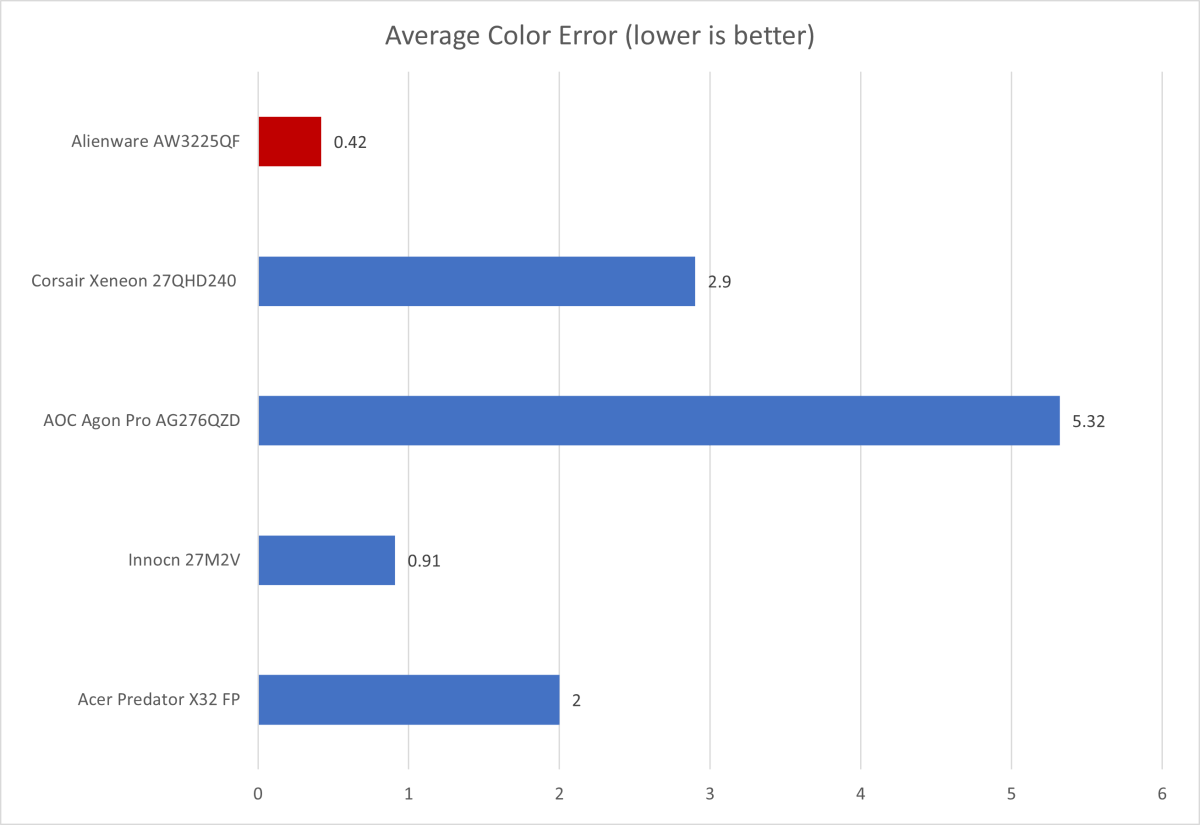
Matt Smith
Next up is color accuracy, and here the AW3225QF is a knockout. The average color error of 0.42 is among the best I’ve ever recorded, and it’s achieved through consistent results across all tested colors. The AW3225QF’s color presentation is lifelike and realistic overall.
The AW3225QF’s image is a bit warm with a color temperature of 6200K. That’s off a target of 6500K. It results in a slightly redder image that might look cozy but can also feel a bit dusty, depending on your preference. The gamma result of 2.2 is directly on-target and means content will appear about as bright as it should. Both the color temperature and gamma can be adjusted, although, as explained earlier, the menu system is a bit fussy in how color temperature and gamma controls are presented.
The AW3225QF performs well and delivers a color gamut that’s far more than adequate for nearly any task you’d perform on a computer.
Sharpness, which is usually a downside for OLED monitors, is good. The 3225QF’s OLED panel packs 137 pixels per inch, a big upgrade over a 32-inch 1440p monitor, which has just 91 pixels per inch. 1440p OLED monitors tend to suffer in sharpness due to a sub-pixel layout that disagrees with Windows, but I found this much less noticeable on the pixel-dense 3225QF.
The Alienware AW3225QF’s SDR image quality results add up to fantastic image quality. It offers a realistic image with vibrant color and a great sense of depth. Brightness is a bit low, but that’s only an issue if you want to use the monitor in a brightly lit room, and the monitor’s many perks make that downside easy to forget.
How is the Alienware AW3225QF’s HDR image quality?
Most OLED monitors support HDR, but the AW3225QF’s certifications suggest it’s a cut above the rest. It has VESA DisplayHDR 400 True Black certification, but also a Peak 1000 (as in, 1,000 nits) mode. And it supports Dolby Vision HDR, a feature common to HDTVs but rare on a computer monitor.
And, as it turns out, the AW3225QF’s HDR performance is better than most OLED monitors I’ve tested. It’s still dim when displaying a full-screen white HDR image, achieving just 220 nits. But that goes up to 306 nits when the image covers 50 percent of the display, and 480 nits when it covers 10 percent of the display (the image should result in at least 1,000 nits).
That’s not bad. A few other OLED monitors, such as the Asus PG27AQDM, perform better: It was brighter in both the 50 percent and 100 percent tests. But the AW3225QF’s HDR results are better than both most competing OLED monitors and a tad superior to prior Alienware OLED monitors, such as the AW3423DWF.
I found the AW3423DWF a strong HDR monitor overall, and not only because of its brightness. It also has a color gamut wide enough to deliver a vivid, beautiful experience, and increasing the resolution to 4K (instead of the 1440p previously common to OLED monitors) brings big gains in sharpness when viewing a 4K source.
The end result is a more cinematic experience than what most prior OLED monitors could achieve. It instead feels close to the Asus ProArt PA32DC, a $3,500 4K OLED display meant for the most demanding professionals. The PA32DC was even brighter in my tests, and reached a wider color gamut, but the Alienware AW3225QF’s overall performance is not far off that high benchmark.
Mini-LED displays are typically better in terms of HDR brightness, and those looking to maximize the HDR experience should look towards a Mini-LED display. But the AW3225QF is no slouch and, given its many other strengths, it’s a competitive choice. That’s especially true if you plan to connect an Xbox Series X alongside a PC to play console games and watch Blu-Ray movies, as the Xbox Series X supports Dolby Vision.
How is the Alienware AW3225QF’s motion performance?
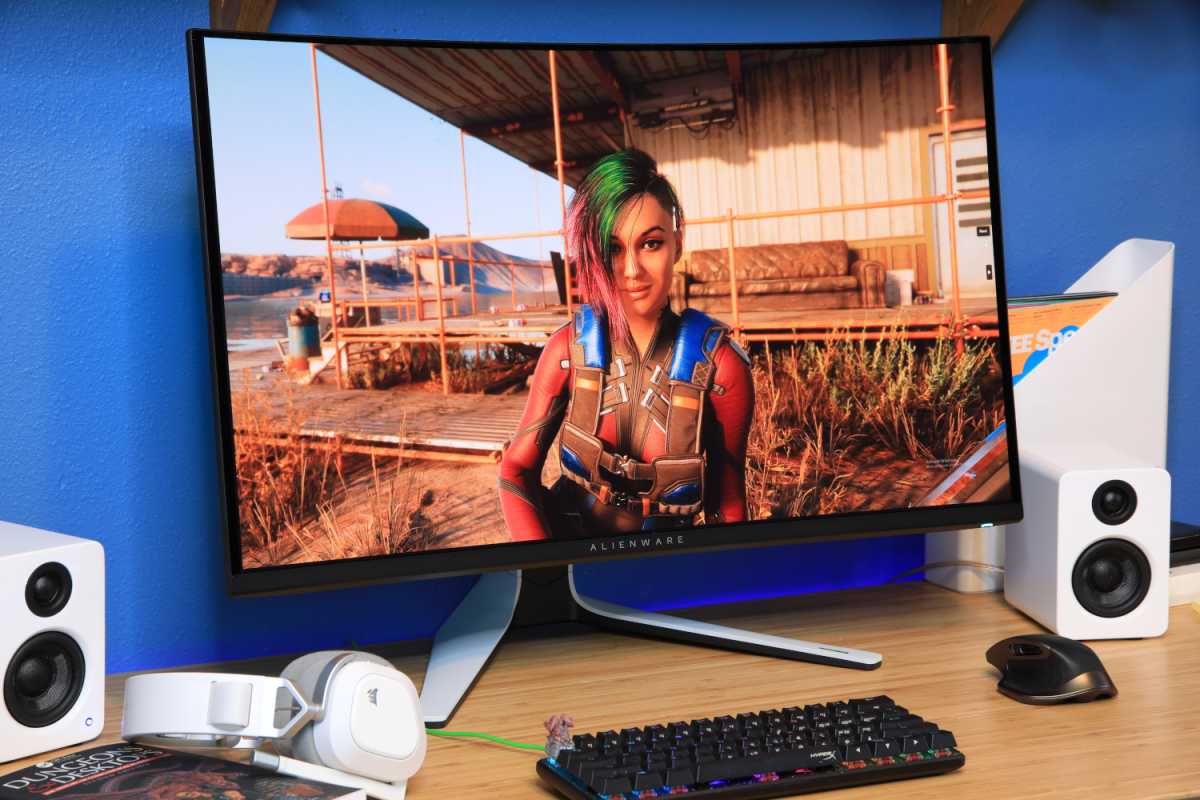
The Alienware AW3225QF comes with a respectable 240Hz refresh rate.
Matt Smith
The AW3225QF’s 240Hz refresh rate doesn’t set records (LG has announced an OLED monitor with a 480Hz refresh rate), but it provides excellent motion clarity. Fast-moving objects are easy to identify and high-resolution textures retain most of their detail when scrolling or moving the camera in a 3D game.
Gamers should remember that OLED panels generally achieve better motion clarity than IPS or VA panel monitors at any given refresh rate. That’s true because the individual pixels of an OLED monitor respond more quickly to changes than IPS or VA. As a result, the motion clarity of the AW3225QF is more similar to a 360Hz IPS or VA panel monitor.
The monitor also supports adaptive sync to eliminate screen tearing and provide smooth frame pacing in 3D games. Its official support includes Nvidia G-Sync and VESA AdaptiveSync 240 certification. AMD FreeSync is not officially supported, but it functioned when tested with a Radeon RX 7800 video card.
Is the Alienware AW3225QF worth it?
Alienware’s AW3225QF is a fantastic 4K OLED monitor. Prior OLED monitors also looked great, but the reliance on 1440p resolution was a downside for those who want the absolute best image quality available. The AW3225QF’s improved sharpness is lovely and comes paired with extra features, like Dolby Vision HDR and support for 4K/240Hz across multiple video inputs. Alienware’s oversized stand is an annoyance, and the curved display panel is an acquired taste, but these issues are relatively minor. Its pricing isn’t bad, either: $1,199 is expensive, but it’s a big reduction compared to prior 4K OLED monitors, which often retailed for $2,000 to $3,000 (or more).




